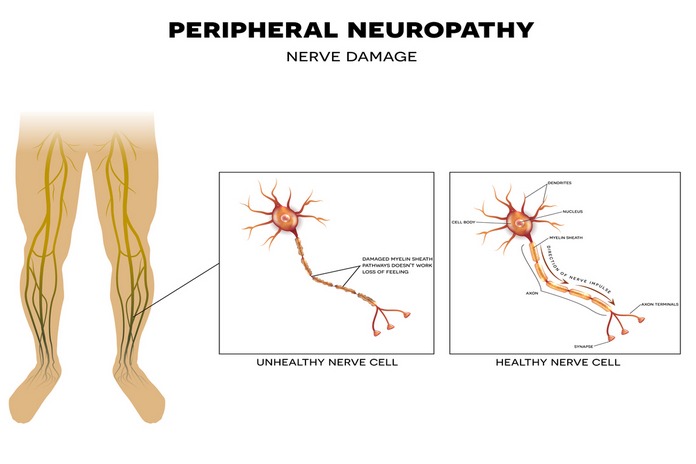Peripheral Neuropathy
Peripheral neuropathy is a nerve-related condition that develops due to damage to the peripheral nerves (nerves outside of the brain and spinal cord). These are the nerves that carry information from the brain and spinal cord to the rest of the body. Peripheral neuropathy can affect any part of the body, but it most commonly affects the hands and feet. It can cause multiple symptoms, depending on which nerves are affected. The most common symptom is sharp, burning pain. Other symptoms include numbness, tingling, and weakness. (1)
Peripheral neuropathy can occur in any part of the body and affect any age group. It is more common in older adults and those with diabetes or chronic kidney disease. However, it can occur in anyone at any time. The cause of peripheral neuropathy can be a variety of things, including diabetes, exposure to toxins, or autoimmune diseases. Treatment for peripheral neuropathy depends on the underlying cause. In some cases, treatment may involve medications or surgery. In other cases, lifestyle changes may be necessary to improve symptoms.

Pathophysiology
The pathophysiology of peripheral neuropathy refers to the specific changes in the structure and function of the peripheral nerves that cause the symptoms of the disorder. Peripheral neuropathy results when the peripheral nerves are damaged. The peripheral nerves are the nerves that control the voluntary muscles and the sensations in the hands, feet, and other parts of the body. (2)
The pathophysiology of peripheral neuropathy is not completely understood, but it is believed that a variety of factors may contribute to its development. This disease develops because of the damage to the myelin sheath, the protective covering around nerve fibers. This can be caused by a number of factors, including injury, infection, autoimmune disorders, and exposure to toxins, damage to the nerve cells themselves, inflammation around the nerves, abnormalities in blood flow to the nerves, and changes in the supporting structures around the nerves.
Other causes of nerve damage include nerve compression, tumors, and metabolic disorders. The symptoms of peripheral neuropathy vary depending on which nerves are affected, but can include pain, numbness, tingling, weakness, and muscle atrophy. There is no cure for peripheral neuropathy, but treatment options are available to help manage its symptoms.

